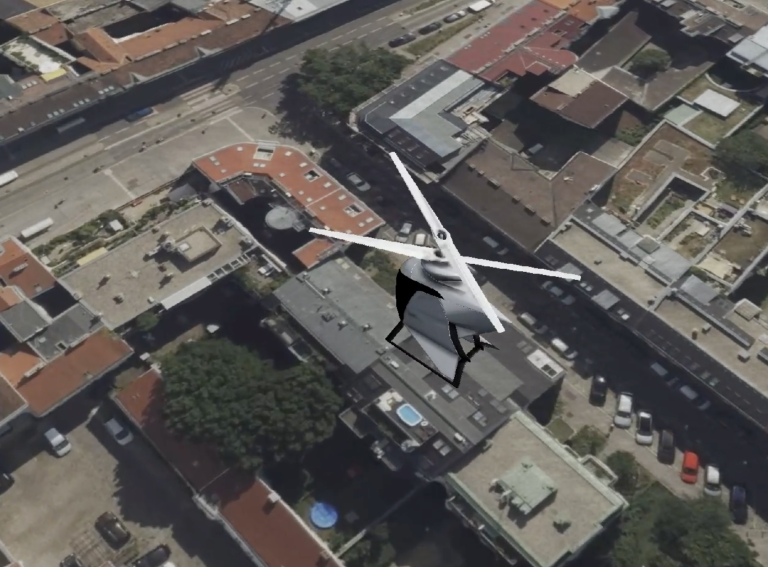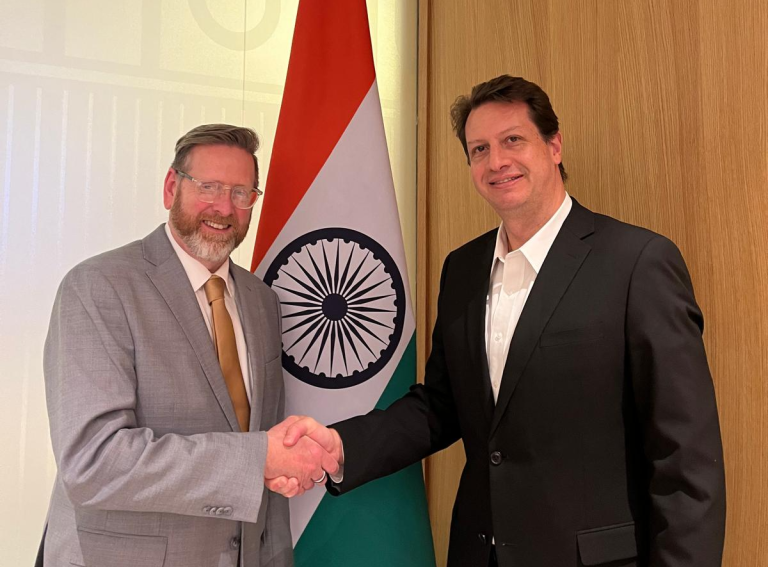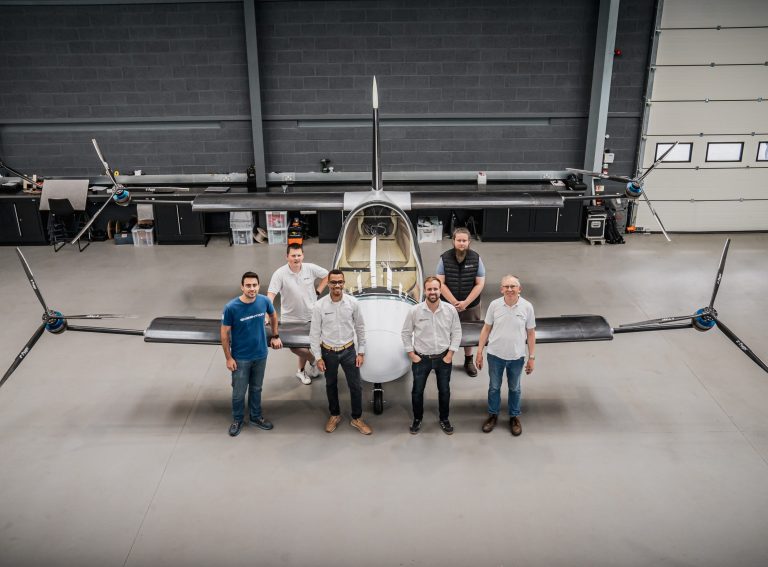This week Zag Daily launched Zag Air, a new editorial section dedicated to the business of Advanced Air Mobility (AAM).
With it comes Radar, a new series of interviews that will track the leading AAM players on their journey to reshape the sustainable air industry.
Kicking the series off is Duncan Walker, CEO of Skyports Infrastructure – an advanced air mobility company responsible for developing the UK’s first vertiport testbed at Bicester Motion. In Dubai, the company is set to host the world’s first vertiport and eVTOL network from Q1 2026.
Zag Daily: What does Skyports do?
Duncan: “Skyports is responsible for the infrastructure for advanced air mobility – or vertiports. Think heliports but for electric aircrafts. We work with leading vehicle manufacturers to find well-located sites, meet regulatory requirements, and serve the markets which airline companies are targeting. People don’t choose to fly somewhere because they love the airport, and they won’t choose to fly somewhere because they love the vertiport, though we want to give them a great experience. They choose to move from A to B because of location – I live in London and will always choose Gatwick over Heathrow because it’s easier for me to get to. It’s the same concept for eVTOLs. A network of vertiports is needed in key locations around and between cities for safe customer processing, and we work on building those networks.”
Zag Daily: What markets does Skyports work in?
Duncan: “We set up in the UK because my initial passion was to do it where I’m from and in a market I really understand. But the reality is it’s a very international market and most of our work is therefore international. The top manufacturers are from all over the world and it’s a regulatory driven market that needs political momentum to get this new form of technology going. A lot of our work is in the Middle East like Dubai, Abu Dhabi and surrounding emirates, and in Saudi Arabia. We also work a lot in Asia, particularly Singapore, Japan, and Korea as well as in the US and Europe. But the first mover markets are looking like they’re in the Middle East.”
Zag Daily: Why do you think the eVTOL momentum is ahead in the Middle East?
Duncan: “It’s quite simple and it’s not necessarily just compared with the UK but also with the US, France, Spain and Italy. It’s the degree of coordination in Middle Eastern central governments. There are often a few senior positions which oversee a large remit within government which allows for extraordinary coordination between stakeholders and means things can move very quickly. As soon as we signed an agreement with the Roads and Transport Authority (RTA) in Dubai, for example, we had two committees set up with all of the stakeholders involved. One was an air-based committee, and one was a land-based committee. Senior people from the electrification space, security agencies, land agencies, utilities agencies and airspace all came together because there was a drive and singular vision which said ‘right, we want this to happen’. The region is solution-focused which can mean rapid progress for emerging technology, and its stakeholders are more forward-thinking than in the UK for example where there are typically loads of consultations and people saying things can’t be done. In the Middle East, there’s a senior level of political buy-in and an understanding that there must be a way to make it happen, so how can we make it happen? It’s a totally different mindset.”
Zag Daily: The UK government just announced £103 million to fund greener aerospace technologies. How does this position the UK now for eVTOL?
Duncan: “Time will tell is the answer. We’ve had the Future of Flight Action Plan under the previous government which has generated good projects which we’ve been a part of. We’re developing the vertiport testbed in Bicester and have drones flying all over the place, and the programme has allowed for some technology and R&D. However, though money is nice, without a political champion, not a lot is going to happen. What we really need is resources dedicated to the Civil Aviation Authority and a stable aviation minister. We’ve had six aviation ministers in the last three years. They’ve been good, well-meaning people but if you’re only enrolled for three months, what can you really achieve? How can you understand what the challenges are? Money is great but unless it comes with a driven vision and a political champion to push the agenda, it’s not going to be very well used.”
Zag Daily: Why are Skyports’ technologies going to revolutionise the market?
Duncan: “We’re a service provider for eVTOL vehicle manufacturers and the true magic is with eVTOLs themselves. Will they revolutionise the market? I think so and I don’t think so at the same time. I don’t in the sense that they’re not trying to replace any other form of transportation. It’s an additional form of transportation which will be convenient for people at hopefully an affordable price point. Having said that, eVTOL will be transformational in the ability to cut down timings on routes which have been difficult to serve from current ground infrastructure. Whether it’s mountains, rivers, lakes, seas, or billions spent on building roads and railways, eVTOLs can cut out all the requirements for those very expensive infrastructure links and connect A to B. Some of those routes will be transformational in how they can move both people and goods between places that have traditionally been difficult to get to.”
Zag Daily: How much cheaper is building a vertiport compared to building a road?
Duncan: “To build a road is a billion dollars before you start. To build a vertiport is four to eight million dollars. The question is can it then cope with the volume that a road or a railway will? Probably not, and you need to do the maths to get the price per ticket. In absolute terms, it’s miles cheaper to build a network of vertiports than a road. But does it help the economics of the overall journey and travel time, and is it serving a meaningful purpose to people around the world? Anyone can go and build a bunch of vertiports, yes they’re highly regulated and you need the right airspace, but I could go build one in the desert in Dubai for example. But that doesn’t serve a purpose. We need one in downtown Dubai that connects the airport to key areas like the marina, or Palm Jumeirah. All of a sudden, that creates a valuable network.”
Zag Daily: One criticism of eVTOL is that it won’t be affordable for the ‘average’ person. Who will eVTOLs be transporting?
Duncan: “It will be an evolution of eVTOL. The first couple of years will be supply constrained and demand won’t be a problem because it will take time to get these vehicles certified. It will then take a long time for volume vehicle production to begin. Building vehicles to meet aviation standards is hard so I think the first few years will be about supply, not demand. The interesting point is when there are enough vehicles in the market to mean that demand is the constraining factor. The question is how to turn this into a meaningful form of transportation for early adopters and then tourists so it’s used regularly. Vehicle manufacturers and airlines want to get it to a price point that’s equivalent to an UberX – a luxury Uber. We’re part of the jigsaw and we need to develop sufficiently low-cost infrastructure so that those price points can be achieved.
“Other things need to happen like manufacturing at scale to achieve economies of scale, and we’ll probably need to achieve autonomous flight too to get the price point low enough for the masses. But will this be the case from day one? I don’t think so. It will happen over the next five years and that’s true of all forms of transportation. When cars came out, was it a vehicle for the masses? Absolutely not. It was only when Ford built Model T that that became a vehicle for the masses because the price got chopped into a quarter. Our aspiration and that of the whole OEM market is that this is not a replication of the helicopter market which is for rich people. We are trying to create a new form of transportation, which is accessible to many. If all it does is replace a combustion engine helicopter with an electric one, then the industry has somewhat failed.”
Zag Daily: Describe Skyports’ biggest milestone achievement.
Duncan: “We built the first vertiport in the world in Singapore in 2019. That had never been done before and it’s something that can never be taken away from us.
“The most meaningful material step was signing the agreement with the RTA in Dubai, which is a long-term fully commercial contract that will lead to the first vertiport and eVTOL network in the world, starting with four vertiports. It will be up and running in Dubai from Q1 2026, which means from then you’ll be able to get into an eVTOL and fly between the various sites of Dubai and hopefully later across the UAE. If you look at the volume of transport on Sheikh Zayed Road between Abu Dhabi and Dubai for example, it takes up to two hours to drive but you could do it in 30 minutes in an eVTOL. That’s a meaningful change, and our work in Dubai is with real live figures and progress happening at pace.
“Another achievement is we raised around $110 million in Series C funding this spring, and we’re the first infrastructure company to have received anything of that size. A lot of money goes into vehicle manufacturers because it takes a lot to build these vehicles, but we’ve not seen them go into other companies that make the advanced air mobility ecosystem work. So, I’m super pleased with that and it puts us in a position where we can deliver on the network for vehicle manufacturers and make this a reality.”
Zag Daily: What do you think is the main challenge this industry needs to overcome?
Duncan: “Certification of vehicles. Until those vehicles are certified there is no industry and anything that requires a third party is a challenge to overcome. 2025 is looking to be the year of certification for the first few. Then I think customer acceptance is the next challenge and building this transport into people’s lives. Then it’s about scale – how quickly can we include this industry in our lives, but also scale the industry?”
Zag Daily: Who is one person you would like to spotlight that you feel is fast-tracking the development of UAM?
Duncan: “JoeBen Bevirt, the CEO of Joby Aviation. He has been a champion for a long time and is really pushing the agenda. Also, His Highness Sheikh Mohammed in Dubai. His level of senior drive, vision and desire has made so much happen so quickly. It requires a breadth of thinking, confidence and desire to see innovation which you don’t get everywhere. Sheikh Mohammed is prepared to put himself out there, sponsor these programmes and create the momentum. It goes back to what I was saying at the start, which is that without political sponsorship we can’t really do anything. That remains true, and he is that sponsor.”




